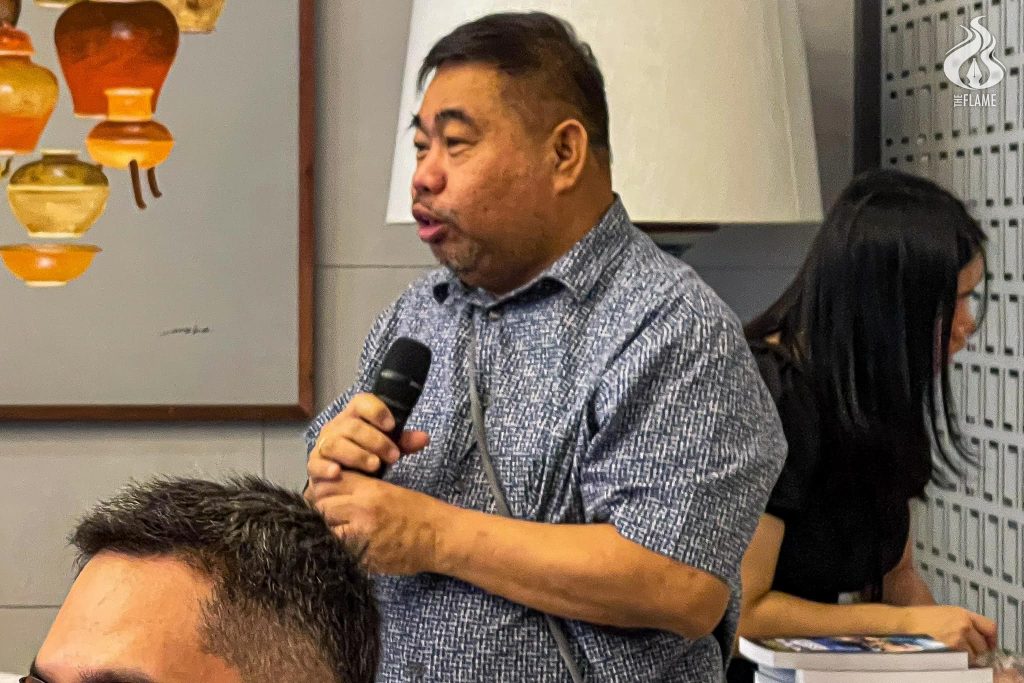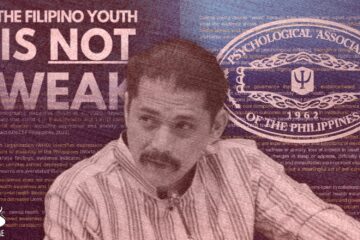
A UST Journalism instructor and Pulitzer Prize-winning reporter has launched what he described as a “no-holds-barred” memoir that detailed key episodes in his 40-year career as well as some unsavory practices in the media.
Manuel Mogato’s 19-chapter memoir titled “It’s Me Bok! Journeys in Journalism” was released on Oct. 19 at the Cignal TV Launch Pad building in Mandaluyong.
Mogato’s self-published book details the “reckless experiences” he had as a budding reporter as well as the corrupt practices in the industry.
“[I]t’s all about my life, my experiences, and the difficulties I endured. But this is a no-holds-barred book. So there are sad stories, happy stories, triumphs, defeats. And there are many embarrassing stories [and] episodes about my reporting job,” Mogato told The Flame.
“I discussed one chapter about the dark side of journalism. When you know corruption in the media is very prevalent, not only during our time but until today… I detailed how I was part of it (corruption) in my younger days but later on realized that these are not morally correct. I’ve changed a lot since those days,” he added.
Mogato, who started his journalism career in 1983, covered several important events in the country, including the downfall of the late dictator Ferdinand Marcos Sr. during the People Power Revolution of 1986, the eruption of Mount Pinatubo in 1991 and the Marawi siege by Islamist terrorists. He worked for a number of media entities, including the defunct Manila Chronicle and foreign news agencies Asahi Shimbun and Reuters Manila.
During his stint at Reuters, Mogato co-wrote the investigative report “Duterte’s War: Inside the bloody drug crackdown in the Philippines” with Clare Baldwin and Andrew Marshall, which won the prestigious Pulitzer Prize in 2018. He is now working as defense and diplomacy editor of One News and editor-at-large of News5 Digital and PressONE.ph.
Mogato graduated with a mass communications degree in 1983 and is pursuing his master’s degree in Communications Management at the Pamantasan ng Lungsod ng Maynila. He joined the UST Journalism department in 2021 and has handled courses on Philippine politics and media and society.
“I’ve been writing snippets of my experiences, of my adventures as a journalist on Facebook. So before my memory fails me, I decided to write the book… I wrote this as a legacy,” he said.
Mistakes and risks
Mogato said journalists should stay away from corrupt practices to build their credibility within the industry. He also urged them not to make the same mistakes he had made before, particularly when covering unexpected events and breaking stories.
“Learn from my mistakes as a journalist for more than 40 years. I said in my book that when I was younger, I was very reckless because I went to assignments without any preparation or anything,” the journalism instructor said.
“I want younger students and future journalists to know what we have experienced in the past. Because I’m sure that the experiences of the journalists now will be more different from what we had experienced in our time because we are in a unique situation,” he added.
Mogato also recalled how his life was placed at risk when he was sent by the Manila Chronicle to cover the aftermath of a plane crash in Benguet. The aircraft suddenly disappeared from the radar and went down in a crash.
Mogato and his team climbed a mountain for about 12 hours without any preparation and knowledge of the actual location of the crash site other than the lead a local resident had given them. They got lost in a tropical rainforest and ended up not finding the crash site.
“And that’s how reckless [and] unprepared we were during that time. But luckily, the Manila Chronicle had a helicopter… The office sent another team, a photographer. So, we were the only ones who had pictures of the crash site,” he said.
In 1989, Mogato covered the jail breakout of the suspects in the killing of former Zamboanga City mayor Cesar Climaco, who was a staunch critic of the martial law regime of Ferdinand Marcos, Sr.
The Air Force troops going to Zamboanga could only accommodate two reporters so he decided to disguise himself as one of the soldiers carrying bullets to be brought to the city. Eager to cover the event, Mogato successfully went to Zamboanga carrying only his shirt and a hundred pesos.
“Luckily, some reporters in Zamboanga gave me a shirt to change and some money to buy food… I don’t have a hotel so I slept at a kariton (cart) on the seaside outside the police headquarters,” he added.
‘Bok’
Asked what the title of his memoir meant, Mogato said ‘bok’ was a nickname given to reporters who covered the military back in the day.
“[T]he military officers, especially the graduates from the Philippine Military Academy (PMA), they call each other bok or mistah. That’s the generic term for PMA graduates—mistah. But informally, they call each other bok,” the journalism instructor said.
Mogato advised journalists who also want to venture into writing memoirs to first consult with the people they plan to include in their piece.
“You don’t know what impression you’ll give off in the book or about yourself… They might be put in a bad light at the end of the story so you have to look for them and talk to them,” he said.
According to Mogato, journalists must also keep a record of their experiences—both commendable and controversial—by writing notes and taking photographs before their memories fade.
“The challenge is there are many details in your life that you cannot write. There are controversies, embarrassing stories. If you’ve done something wrong, you cannot write that. [But] You have to live with that as a journalist—that not all were sweet memories,” he said. F



